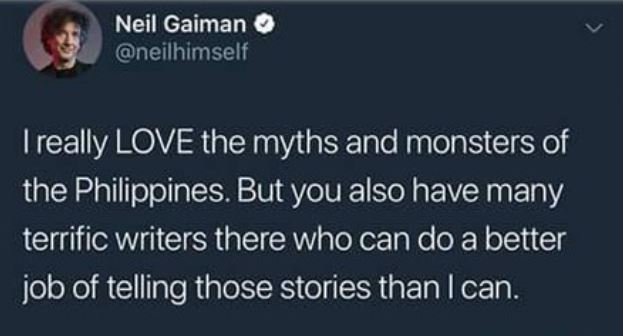Neil Gaiman, a writer with multiple awards under his belt, tweets,
"I really LOVE the myths and monsters of the Philippines. But you also have many terrific writers there who can do a better job of telling those stories than I can." - Neil Gaiman.
Neil Gaiman a multi award winning writer is absolutely right: Let Filipino storytellers take the lead with Philippine myths. Our mythologies are deeply ingrained in the tapestry of our culture. Stories of diwatas and aswangs have captivated Filipinos for generations, and they continue to do so today. It's our cultural essence transformed into fiction, a tradition passed down through centuries. In a tweet, Neil Gaiman, the brilliant mind behind The Sandman and American Gods, expressed his admiration for Philippine myths and monsters. His works draw heavily from various mythologies, with American Gods placing deities from different mythologies in modern America, and Norse Mythology reimagining tales from Norse myths to be more accessible to readers. Neil's reminder couldn't have come at a better time . While confessing his fondness for manananggals in the same thread, Neil emphasized that we "also have many terrific writers" who can tell our stories better than he can. In response to Neil's tweet, bookworms have started threads recommending works by local authors that showcase Philippine myths, including Arnold Arre’s graphic novel Mythology Class, Dean Alfar’s collection of short stories The Kite of Stars, the Trese comics by Budjette Tan and Kajo Baldisimo, and Edgar Samar’s young adult series Janus Silang, among others. However, beyond book recommendations, Neil's interaction with this Filipino fan highlights a sobering reality: we're not giving enough attention to our own authors and myths.
While growing up, we are immersed in classic Western mythologies, missing out on the vibrant, diverse world of our own folklore. Internalized Stereotypes: The vibrant and complex Philippine mythology endures today thanks to its oral tradition passed down since ancient times. Some Filipinos may unintentionally adopt stereotypes or biases against their own culture, a phenomenon known as cultural cringe, where individuals undervalue their own cultural heritage. Some attribute this oversight to colonialism, cultural appropriation, and internalized colonial mentality, even suggesting that folklore should be regarded as an ancestral heritage that needs preservation.

No comments:
Post a Comment
Note: Only a member of this blog may post a comment.